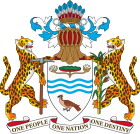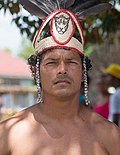| |||||||||||||||||||||||||||||||||||||||||||||
All 65 seats in the National Assembly 33 seats needed for a majority | |||||||||||||||||||||||||||||||||||||||||||||
|---|---|---|---|---|---|---|---|---|---|---|---|---|---|---|---|---|---|---|---|---|---|---|---|---|---|---|---|---|---|---|---|---|---|---|---|---|---|---|---|---|---|---|---|---|---|
| Turnout | 70.24% ( | ||||||||||||||||||||||||||||||||||||||||||||
| |||||||||||||||||||||||||||||||||||||||||||||
 Results after the election post-recount | |||||||||||||||||||||||||||||||||||||||||||||
| |||||||||||||||||||||||||||||||||||||||||||||
 |
|---|
| Constitution |
|
|
Snap general elections were held in Guyana on 2 March 2020. They were called early after the government of President David A. Granger lost a vote of no confidence by a margin of 33–32 on 21 December 2018,[2] the government having held a one-seat majority since the 2015 elections. However, one of its own MPs, Charrandas Persaud of the Alliance for Change (AFC), voted with the opposition.[2] Granger announced on 25 September 2019 that the elections would be held on 2 March 2020.[3]
The elections were expected to be one of the most significant since Guyanese independence in 1966 because of one of the largest new discoveries of oil in the world off the coast of the country.[4] According to ExxonMobil, Guyana could be producing 750,000 barrels of oil per day within five years, and the expected revenue from this oil would dwarf Guyana's previous US$3 billion GDP and transform its development possibilities.[5]
Nine parties contested the elections for the presidency and for the 65 seats in the National Assembly.[3] Although election day and the initial count was deemed to be free, fair and credible, the process of tabulating the votes was widely seen to have been fraudulent. The final region to declare gave a significant boost to the ruling APNU+AFC alliance, allowing it to overtake the main opposition party, the People's Progressive Party/Civic (PPP/C). Bruce Golding, a former Prime Minister of Jamaica, who was present during the elections, stated he had "never seen a more transparent attempt to alter the result of an election".[6]
Attempts to swear David A. Granger back in as president were thwarted when an injunction was granted on 6 March by the High Court to block the declaration of the overall results of the elections until the matter could be heard and determined. Granger subsequently agreed to a recount, which was completed on 8 June. The recount showed that the PPP/C party won the most votes, with a bare majority of one seat. Thereafter, several more legal challenges were launched in an attempt to nullify the results of the recount and even to prevent tens of thousands of cast ballots from being registered as valid. However, on 2 August 2020, several days after the Court of Appeal ruled that the results of the recount be utilized as the official results of the election, PPP/C leader Irfaan Ali was ultimately sworn in as president, with Mark Phillips as Prime Minister.[7]
Cite error: There are <ref group=lower-alpha> tags or {{efn}} templates on this page, but the references will not show without a {{reflist|group=lower-alpha}} template or {{notelist}} template (see the help page).
- ^ "New parties hope to use one seat to force PPP/C, APNU to work together". News Room Guyana. 8 June 2020. Retrieved 3 August 2020.
- ^ a b "Elections in Guyana within 90 days as Granger gov't loses vote of no confidence 33-32" Archived 2019-03-30 at the Wayback Machine Caribbean Chronicle, 22 December 2018.
- ^ a b Guyana goes to the polls March 2, 2020 Archived 2 January 2020 at the Wayback Machine Jamaica Observer, 26 September 2019
- ^ "Oil riches raise the political stakes in Guyana". The Economist. ISSN 0013-0613. Retrieved 3 August 2020.
- ^ Parraga, Marianna (20 January 2020). "Guyana's first-ever oil cargo to be refined by Exxon in the U.S." Reuters. Retrieved 4 August 2020.
- ^ "Golding exposes electoral fraud at OAS meeting". Stabroek News. 14 May 2020. Retrieved 10 June 2020.
- ^ "Irfaan Ali sworn in as President". Stabroek News. 2 August 2020. Retrieved 3 August 2020.


